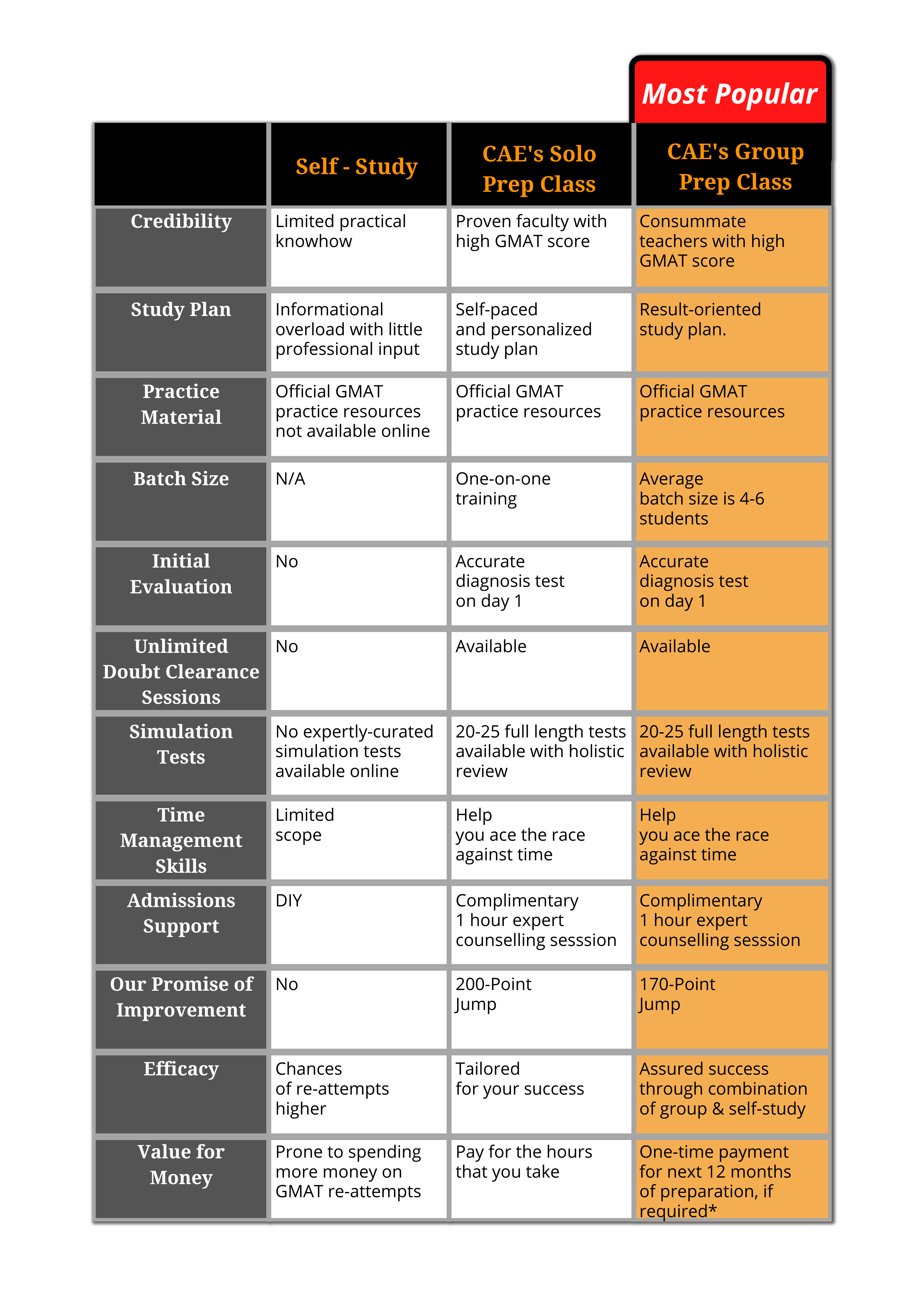How To Achieve A 700+ GMAT Score?
You’ve Come To The Right Place!
Official: Just 12% of GMAT candidates get a 700+ score
How To Achieve A 700+ GMAT Score?
Official: Just 12% of GMAT candidates get a 700+ score
CAE's Proof of Excellence

Vyom NeerajGMAT - 750

Harjot Singh KohliGMAT - 710

Madhav Sharma
GMAT - 740

Divya AryaGMAT - 710

Kush Aggarwal
GMAT - 720

BhavikGMAT - 700
CAE students have twice as much chance of securing a 700+ score
We help you secure admission in prestigious American and Indian B-schools
Individual Prep Class (Online)
- Personalised Study Plan
- Average Increase of 200 Points
- Curated Practice Material
Group Prep Class (Online)
- Batch Size : 4 to 6
- Average Increase of 170 Points
- 50+ Live Sessions by Expert Faculty
CAE's Proof of Excellence

Vyom NeerajGMAT - 750
Madhav Sharma
GMAT - 740


Harjot Singh KohliGMAT - 710
Divya AryaGMAT - 710

BhavikGMAT - 700
CAE students have twice as much chance of securing a 700+ score
We help you secure admission in prestigious American and Indian B-schools
Individual Prep Class (Online)
- Personalised Study Plan
- Average Increase of 200 Points
- Curated Practice Material
Group Prep Class(Online)
- Batch Size : 4 to 6
- Average Increase of 170 Points
- 50+ Live Sessions by Expert Faculty
3 Common Obstacles Students Face In Their GMAT Journey
3 Common Obstacles Students FaceIn Their GMAT Journey

Uncover Your True GMAT Potential With CAE’s Expert Guidance
29 Years of Educational Excellence | 22,000+ Students Trained Under High-Level Expertise
Uncover Your True GMAT Potential With CAE’s Expert Guidance
29 Years of Educational Excellence
22,000+ Students Trained Under High-Level Expertise
We Make You Work Smarter, Not Harder!
We Make You Work
Smarter, Not Harder!
CAE’s GMAT Classes Your Roadmap To IVY League
CAE’s GMAT Classes Your Roadmap To IVY League
GMAT FAQs
Q. Why should I study GMAT?
A majority of business schools in theUS and Canada use the Graduate Management Admission Test (GMAT) as a prerequisite for gaining admission to an MBA program.
GMAT scores are also considered for admission to Masters or PhD programs in business major, such as Finance, Marketing, Accounting etc.
Q. What are the four sections of GMAT?
The GMAT can be broken down into four sections:
#1 Analytical Writing Assessment
#2 Integrated Reasoning
#3 Quantitative Reasoning
#4 Verbal Reasoning
Q. What is the GMAT syllabus?
Analytical Writing: Candidates are required to present a well-researched argument through their writing skills.
Integrated Reasoning: Test-takers are required to do data analysis of graphs, tables, charts and passages. This section tests your higher-order thinking skills.
Quantitative Reasoning: Problem Solving and Data Sufficiency are the two types of questions that will be asked in this section. Candidates should have elementary knowledge about algebra and clear understanding of geometry.
Verbal Reasoning: Test-takers will be given passages related to social sciences, technology or business-related fields. S/he is required to make grammatically-correct critical inferences of the passage.
Q. What is the structure of the GMAT?

Students can now choose the order in which they wish to take the GMAT test. The three options available are:
Option #1: Analytical Writing Assessment, Integrated Reasoning, Quantitative, Verbal
Option #2: Verbal, Quantitative, Integrated Reasoning, Analytical Writing Assessment
Option #3: Quantitative, Verbal, Integrated Reasoning, Analytical Writing Assessment
.
Q. How is the GMAT scored?

Q. When is the ideal time to appear for GMAT?
Our nearly three decades of experience suggests candidates should start training for GMAT 12-18 months before s/he plans to go to the States for her/his MBA program.
Q. How long are the GMAT score valid for?
GMAT score is valid for 5 years.
Q. How many times can I appear for the GMAT?
You can appear for the GMAT fives times in 12 months and not more than eight times during your lifetime.
CAE allows you to study with us for nine months from the time of enrollment with us.
Q. GMAT is a computer-adaptive test. What does that mean?
The GMAT is unique because it adjusts according to the candidate’s proficiency.
The exam starts off with questions of moderate difficulty. If the candidate keeps answering the questions right, the level of difficulty increases with each passing question.
If the candidate gets the questions with average difficulty wrong, the difficulty level decreases.
This is the reason why roughly 20% of GMAT questions are not scored. That’s because these are questions of average difficulty.
Q. How is the GMAT scored?

Q. When is the ideal time to appear for GMAT?
Our nearly three decades of experience suggests candidates should start training for GMAT 12-18 months before s/he plans to go to the States for her/his MBA program.
Q. How long are the GMAT score valid for?
GMAT score is valid for 5 years.
Q. How many times can I appear for the GMAT?
You can appear for the GMAT fives times in 12 months and not more than eight times during your lifetime.
CAE allows you to study with us for nine months from the time of enrollment with us.
Q. GMAT is a computer-adaptive test. What does that mean?
The GMAT is unique because it adjusts according to the candidate’s proficiency.
The exam starts off with questions of moderate difficulty. If the candidate keeps answering the questions right, the level of difficulty increases with each passing question.
If the candidate gets the questions with average difficulty wrong, the difficulty level decreases.
This is the reason why roughly 20% of GMAT questions are not scored. That’s because these are questions of average difficulty.
GMAT FAQs
Q. Why should I study GMAT?
A majority of business schools in theUS and Canada use the Graduate Management Admission Test (GMAT) as a prerequisite for gaining admission to an MBA program.
GMAT scores are also considered for admission to Masters or PhD programs in business major, such as Finance, Marketing, Accounting etc.
Q. What are the four sections of GMAT?
The GMAT can be broken down into four sections:
#1 Analytical Writing Assessment
#2 Integrated Reasoning
#3 Quantitative Reasoning
#4 Verbal Reasoning
Q. What is the GMAT syllabus?
Analytical Writing: Candidates are required to present a well-researched argument through their writing skills.
Integrated Reasoning: Test-takers are required to do data analysis of graphs, tables, charts and passages. This section tests your higher-order thinking skills.
Quantitative Reasoning: Problem Solving and Data Sufficiency are the two types of questions that will be asked in this section. Candidates should have elementary knowledge about algebra and clear understanding of geometry.
Verbal Reasoning: Test-takers will be given passages related to social sciences, technology or business-related fields. S/he is required to make grammatically-correct critical inferences of the passage.
Q. What is the structure of the GMAT?

Students can now choose the order in which they wish to take the GMAT test. The three options available are:
Option #1: Analytical Writing Assessment, Integrated Reasoning, Quantitative, Verbal
Option #2: Verbal, Quantitative, Integrated Reasoning, Analytical Writing Assessment
Option #3: Quantitative, Verbal, Integrated Reasoning, Analytical Writing Assessment
.



